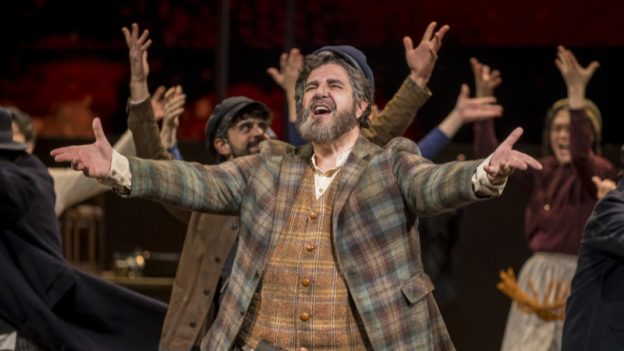September 13 through October 12, 2025
The Alliance Theatre, Woodruff Arts Centre
Atlanta, Georgia – USA
Jerry BOCK, Sheldon HARNICK & Joseph STEIN: Fiddler on the Roof
Or Matias, conductor; Tomer Zvulun, director; Jerry Bock, composer; Sheldon Harnick, lyricist; Joseph Stein, book. Cast: Itzik Cohen (Tevye), Debbie Gravitte (Golde), Mila Bolash (Ensemble / Cellist / Gossip Soloist), Deborah Bowman (Grandma Tzeitel / Shaindel), Lowery Brown (Constable / Guitarist), Sully Brown (Ensemble / Bottle Dancer), Galen Crawley (Fruma-Sarah / Ensemble), Nicholas Cunha (Swing / Dance Captain), Joanna Daniels (Yente), Kylie Dickinson (The Fiddler), Coby Getzug (Motel), Maya Jacobson (Chava), Nick Walker Jones (Nachum / Ensemble / Bottle Dancer), Brian Kurlander (Mordcha), Isaac Alan Lindy (Ensemble / Bottle Dancer), Kristin Markiton (Ensemble / Gossip Soloist), Eli Mayer (Fyedka), Noelle McIntyre (Ensemble), Hannah Morrison (Ensemble / Bottle Dancer / Fight Captain), Eric Nabeth (Avram / Accordion Player), Hensley Peters (Bielke), Mia Pinero (Hodel), Oliver Prose (Perchik), Jeremy Radin (Lazar Wolf), Katie Rogers (Swing), Cleo Saliers (Shprintze), Ron Segal (Rabbi), Sebastian Serra (Ensemble / Bottle Dancer), Zachary Shanks (Ensemble / Bottle Dancer), Amanda Fallon Smith (Tzeitel), Brian Wittenberg (Mendel / Ensemble). Creative: Alexander Lisiyansky, scenic designer; Vita Tzykun, costume designer; Chloe Treat, choreographer; Thomas C. Hase, lighting designer; Dan Moses Schreier, sound designer; Nicholas Hussong, projection designer; Lindsey Ewing, wig & makeup designer; Jake Guinn, fight choreographer; Ricardo Aponte, associate director & associate choreographer; Greg Matteson, assistant conductor & associate music director; Gregory Luis Boyle, assistant director; Amy Sutton, associate costume designer; Natalia Carlson, associate lighting designer; Alana Spach, associate hair & wig designer; Theresa Flanagan, stage manager; Xiaonan Chloe Liu, assistant stage manager; Aletha Saunders, assistant stage manager; Ashley Dickey, stage management production assistant; Phoebe Sweatman, young performer supervisor.
Mark Gresham | 15 SEP 2025
Few musicals balance personal intimacy with cultural sweep as deftly as Fiddler on the Roof. The Atlanta Opera and Alliance Theatre’s co-production, running through October 12 at the Alliance Theatre’s Coca-Cola Stage, embraces both sides of this classic work. From the first moments onstage, the production reminds us how deeply roots and tradition shape the people of Anatevka, even as the world around them begins to shift. Director Tomer Zvulun and conductor Or Matias have crafted a production that is both warmly humorous and sharply relevant, intimate and communal, and universal, reminding us why this story has remained an enduring landmark of musical theater since its 1964 Broadway debut.
Based on Sholem Aleichem’s Yiddish stories about Tevye the Dairyman (written 1894–1914), Fiddler on the Roof unfolds in the fictional shtetl of Anatevka in 1905, a place much like the many small Jewish towns that dotted the Kiev Governorate in the late Russian Empire, during Tsar Nicholas II’s reign. It was a world on edge: Russia was reeling from the Russo-Japanese War, revolution was brewing, and pogroms were sweeping across Ukraine—including the infamous October 1905 pogrom in Kiev (Ukranian: Kyiv).
Tevye’s hardscrabble existence as a dairyman reflects the economic reality of most Jews in the Pale of Settlement. Barred from owning farmland and restricted in where they could live, Jews relied on small trades, crafts, and market work—often barely surviving. By 1897, 5.2 million Jews lived in the Pale, with nearly one-third relying on welfare. Matchmakers, dowries, and the dream of a better future (Tevye’s “If I Were a Rich Man”) were not just dramatic devices but part of daily life.
The heart of the musical—the push and pull between tradition and change—mirrors the period’s cultural tensions. Hasidic piety and synagogue life bound shtetl communities together, yet modern ideas from the Haskalah (Jewish Enlightenment), socialism, and Zionism were spreading quickly. Tevye’s daughters’ defiance of arranged marriages captures that generational shift.
The play’s climax, where Anatevka’s Jews are forced to leave, reflects the grim reality of state-sanctioned expulsions and pogroms. Mobs destroyed homes, businesses, and lives—often with official complicity—driving more than two million Jews to emigrate from the Russian Empire between 1880 and 1920, many heading for Poland (Kraków, Łódź, and Warsaw, which were major centers of Jewish culture and commerce); Western Europe (especially Paris and Antwerp), the Holy Land (under the Ottoman Empire), other parts of the Russian Empire, Argentina, South Africa, Canada, and especially America, which absorbed about 70–80% of emigrants.
At the center of Fiddler’s story is Tevye (Itzik Cohen), whose mix of wry humor, moral struggle, and paternal love makes the evening sing. His Tevye is less a distant figure from the shtetl and more a man we feel we know — a neighbor, a father, a friend. His negotiations with his daughters reveal the weight of inherited tradition and the stubborn endurance of cultural memory.
Golde (Debbie Gravitte) serves as Tevye’s grounding force with her pragmatic, flinty warmth and dry wit concealing deep reservoirs of care. “Do You Love Me?” emerges as one of the evening’s most touching moments, their duet quietly unveiling decades of shared life and showing how personal bonds are interwoven with inherited roles and expectations.
The three oldest daughters — Tzeitel (Amanda Fallon Smith), Hodel (Mia Pinero), and Chava (Maya Jacobson) — are depicted as fully realized young women, each embodying a different kind of negotiation for Tevye between tradition and change. Smith’s Tzeitel glows with joy as she secures her match with Motel (played with charm and sincerity by Coby Getzug), whose “Miracle of Miracles” is both endearing and exuberant. Pinero’s Hodel is poised and passionate, her bittersweet “Far From the Home I Love.” Jacobson’s Chava is the most heart-rending, her plea to be seen as both daughter and wife breaking against Tevye’s immovable convictions. Through them, the audience senses how deeply the village’s values permeate even those who wish to chart a different course.
The men who challenge Tevye’s worldview are equally well drawn as partners to each of his daughters. Motel evolves from bashful tailor to proud husband. Perchik (Oliver Prose) injects idealistic fire into Act II, making the political dimension of the story feel urgent rather than quaint. Fyedka (Eli Mayer), a Russian Christian whose love for Chava forces Tevye to confront the limits of his tolerance, offers quiet, consistent dignity that softens—though cannot erase—the pain of her estrangement.
Comic ballast comes from the matchmaker Yente (Joanna Daniels), while the moneyed butcher Lazar Wolf (Jeremy Radin) is not merely bluster but shows the heartbreak beneath his wounded pride. Supporting roles add rich texture: the innkeeper, Mordcha (Brian Kurlander), keeps his tavern lively, while the Rabbi (Ron Segal—an actual rabbi by profession, in his first theatrical role since college) and Mendel (Brian Wittenberg) give the shtetl a moral and comedic center. These characters and the rest of the ensemble create a believable community — a living, breathing Anatevka whose habits, joys, and struggles remain lodged in memory even as its people face upheaval.
As a counterpoint to the villagers, the Constable (Lowrey Brown) stands as a focal intermediary for the outside world whose authority and presence highlight the tension between tradition and forces beyond the shtetl. While less vicious than Aleichem’s original Constable, any empathy he shows is tempered by his duty to the imperial powers above him.

Itzik Cohen as Tevye, with Kylie Dickinson as the Fiddler high above the set, in an early scene from Atlanta Opera and Alliance Theatre’s co-production of “Fiddler on the Roof.” (credit: Raftermen)
The center of Alexander Lisiyansky’s scenic design is a pair of wooden structures that together imply two-thirds of a globe, an incomplete spherical grid without mapped national borders; the halves are moved by cast to change scenes, framing the action in a world that feels at once solid and precarious. As with his cart—absent its horse—Tevye himself occasionally pulls the structures around, as if bearing the weight of the world, not just his family. But it could also be imagined as a bubble, within which the shtetl community is insulated. The structural elements and scene changes are colorfully enveloped by Nicholas Hussong’s projections and Thomas C. Hase’s lighting, helping shape the shifting mood; further enhanced by projected video.
Vita Tzykun’s costumes are richly detailed, evoking Anatevka, while Chloe Treat’s choreography feels right on target. The bottle dance—performed with remarkable precision—is a genuine showstopper.

The Bottle Dance from the Atlanta Opera and Alliance Theatre’s “Fiddler on the Roof.” (credit: Raftermen)
Matias conducts with idiomatic flair, drawing out the klezmer-infused colors of Jerry Bock’s score from the 13-piece ensemble drawn from The Atlanta Opera Orchestra.
The closing moments were handled with restraint and gravity. The final departures leave the audience with a palpable sense of the shtetl’s hold on the hearts of its people—the customs, the joys, and the sorrows persist in memory, even as the characters are scattered to new worlds. And the symbolic Fiddler
In the end, this production succeeds not merely as a revival but as a renewal, asking fresh questions about how we carry tradition forward when the ground beneath us shifts. For Atlanta audiences, this Fiddler on the Roof is both an artistic achievement with a lot of heart and a mirror held up to our own age of uncertainty, reminding us that who we are is never wholly separated from where we come from. ■
EXTERNAL LINKS:
- The Atlanta Opera: atlantaopera.org
- Alliance Theatre: alliancetheatre.org

Read more by Mark Gresham.







.png)